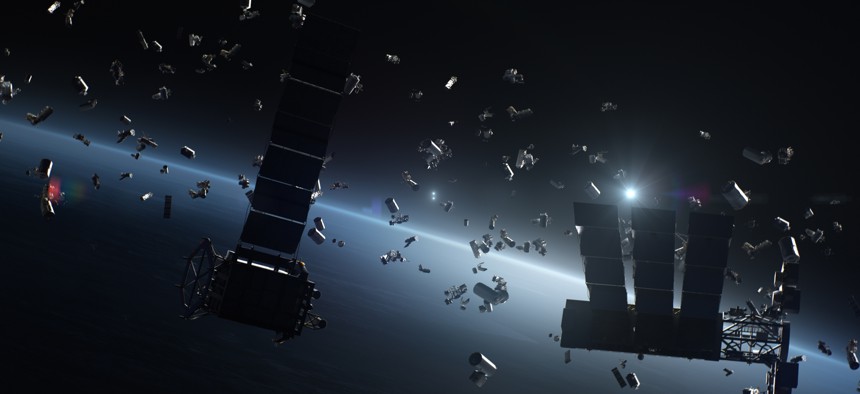FCC Officially Launches Its Space Bureau

One of the key duties of the new office will be to help with satellite regulation and mitigating orbital debris. EvgeniyShkolenko/Getty
The agency launched the Space Bureau and Office of International Affairs after reorganizing its International Bureau.
The Federal Communications Commission officially added two new departments to its org chart on Tuesday: the Space Bureau and the Office of International Affairs in an effort to bolster U.S. leadership in space and help with satellite regulation and mitigating orbital debris.
The FCC originally announced it would launch the Space Bureau in November and later approved its creation in a vote in January. The Space Bureau and the new Office of International Affairs will replace the International Bureau, which previously dealt with international telecommunications and satellite programs and policies, such as licensing and regulation. The reorganization plan was approved by the Office of Management and Budget and the necessary Congressional committees. The reorganization will be complete when there is a Federal Register filing.
“This reimagined Space Bureau we’re launching today is going to support United States leadership in the emerging space economy, promote long-term technical capacity to address satellite policies and approve our coordination with other agencies on all of these issues,” FCC Chairwoman Jessica Rosenworcel said during Tuesday’s kickoff event.
Julie Kearney will lead the Space Bureau and Ethan Lucarelli will lead the Office of International Affairs.
Kearney outlined her vision for the new Space Bureau, emphasizing the team’s experience.
“I really see the Space Bureau as a place for the team to grow, learn, innovate and thrive and we do have a very talented team joining the new bureau,” she said. “We’ll be bringing in more people as well in the coming weeks and months and we’re just very excited to collaborate with our colleagues in the industry.”
Kearney said she did the math and estimates the team has more than 175 years of experience already. ”And so my vision for the Bureau is that we are coming in hot right out at the gate.”
According to Kearney, priorities for the Space Bureau will be to promote American leadership as well as cooperation between industry and government.
“The first thing we’re really focused on, of course, is modernizing regulations to match our new realities and supporting tech innovation,” she said. “And simultaneously focusing on space, orbital debris and space safety … Another thing is fostering transparency.”
She added that visibility and in-person interaction will also be a focus, as well as being engaged and available.
“We want to be out there,” Kearney said. “We want to have people visit us. We also want to be … outside of D.C. to have some hands-on experience with the tech that we’re seeing on paper. And ideally, well they’ll pick up the phone if I call you, but also hopefully you will be calling us as well. And this is an open invitation. We want to be engaged, continuing in the tradition that the Commission has with those companies it regulates, so we’ll carry that forward.”
Kearney stated that the Space Innovation Agenda—under which the FCC is accelerating regulatory review processes, growing the size of the agency’s satellite division by 38%, developing new opportunities for satellite broadband services and modernizing spectrum— would also be a big focus for the Space Bureau “in terms of accelerating processes for application processing, facilitating innovative technologies and novel space activities, but also updating space safety rules.”
Furthermore, she highlighted the FCC’s notice of proposed rulemaking on supplemental coverage from space, for which the agency is seeking comments and the revision of spectrum sharing rules for non-geostationary orbit and fixed satellite surface systems, as examples of items the Bureau will be working on. Additionally, she noted that the Space Bureau will be working to streamline processes, particularly for applications. According to Kearney, other priorities include looking at in-space surface assembly and manufacturing.
She noted that the Space Bureau and Office of International Affairs would work in tandem, for example, on the 2023 World Radiocommunication Conference.
“I’m most excited to be working with the FCC team accelerating the pace of satellite innovation to deliver communications to all people and that is a theme I think that runs through my career,” Kearney said. “Also promoting and demonstrating U.S. leadership in the space economy and helping our friends and colleagues and industry and government to make that a reality.”



